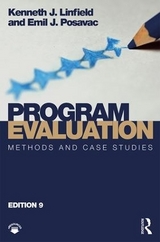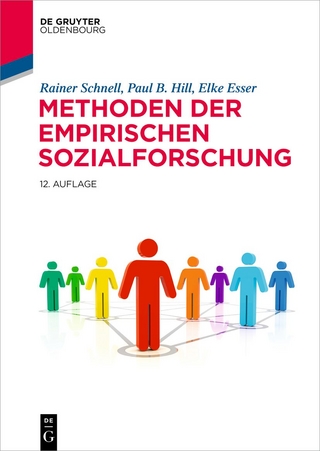
Program Evaluation
Pearson (Verlag)
978-0-205-80497-9 (ISBN)
- Titel erscheint in neuer Auflage
- Artikel merken
Comprehensive yet accessible, this text provides a practical introduction to the skills, attitudes, and methods required to assess the worth and value of human services offered in public and private organizations in a wide range of fields. Students are introduced to the need for such activities, the methods for carrying out evaluations, and the essential steps in organizing findings into reports. The text focuses on the work of people who are closely associated with the service to be evaluated, and is designed to help program planners, developers, and evaluators to work with program staff members who might be threatened by program evaluation.
Emil J. Posavac (Ph.D., University of Illinois, Champaign) is Professor Emeritus of Psychology at Loyola University of Chicago where he served as director of the Applied Social Psychology Graduate Program and chairman of the Psychology Department. He has consulted with a number of public and private organizations. He has published over sixty papers and chapters, edited or co-edited six volumes on program evaluation and applied social psychology, and written numerous evaluation reports for health care and educational institutions. He has written a textbook (with Eugene B. Zechmeister) on statistical analysis based on emerging orientations that emphasize a more complete understanding and presentation of data. In 1990, he was awarded the Myrdal Award by the American Evaluation Association for his contributions to the advancement of program evaluation practice. Since retirement he has taught at the University of Rochester (Simon Graduate School of Business), Rochester Institute of Technology, and Trevecca Nazarene University. He teaches English as a Second Language at his church in Franklin, Tennessee.
TABLE OF CONTENTS
1 Program Evaluation: An Overview
Evaluation Tasks That Need to Be Done
Common Types of Program Evaluations
Activities Often Confused with Program Evaluation
Different Types of Evaluations for Different Kinds of Programs
Purpose of Program Evaluation
2 Planning an Evaluation
An Overview of the Core Purposes of Evaluation
Steps in Preparing to Conduct an Evaluation
Dysfunctional Attitudes Making Program Evaluation Challenging
3 Developing and Using a Theory of the Program
Developing a Program Theory
Evaluation Questions Flow from Program Theory
Cautions in Choosing Evaluation Criteria
Identifying Goals and Objectives
Some Practical Limitations in Selecting Evaluation Criteria
4 Developing Measures of Implementation and Outcomes
Sources of Data for Evaluation
Gathering Information Wisely
Case Study 1: Using Multiple Measures in an Evaluation of a Summer Community Program for Youth
Types of Measures of Evaluation Criteria
Preparing Special Surveys
5 Ethics in Program Evaluation
Standards for the Practice of Evaluation
Ethical Issues Involved in the Treatment of People
Role Conflicts Facing Evaluators
Recognizing the Needs of Different Stakeholders
The Validity of Evaluations
Avoiding Possible Negative Side Effects of Evaluation Procedures
Institutional Review Boards and Program Evaluation
Ethical Problems Evaluators Report
6 The Assessment of Need
Definitions of Need
Sources of Information for the Assessment of Need
Inadequate Assessment of Need
Using Needs Assessments in Program Planning
7 Monitoring the Implementation and Operation of Programs
Monitoring Programs as a Means of Evaluating Programs
What to Summarize with Information Systems
Program Records and Information Systems
Avoiding Common Problems in Implementing an Information System
8 Qualitative Evaluation Methods
Evaluation Settings Best Served by Qualitative Evaluations
Gathering Qualitative Information
Case Study 2: Using Qualitative Methods in an Evaluation of a University Library
Carrying Out Naturalistic Evaluations
Coordinating Qualitative and Quantitative Methods
Philosophical Assumptions
9 Outcome Evaluations with One Group
One-Group Evaluation Designs
Uses of One-Group, Descriptive Designs
Case Study 3: A Pretest-Posttest Design to Evaluate a Peer-Based Program to Prevent Skin Cancer
Threats to Internal Validity
Construct Validity in Pretest-Posttest Designs
Overinterpreting the Results of One-Group Designs
Usefulness of One-Group Designs as Initial Approaches to Program Evaluation
10Quasi-Experimental Approaches to Outcome Evaluation
Increasing the Number of Times Observations Are Made
Observing Other Groups
Case Study 4: Nonequivalent Control Groups Used to Evaluate an Employee Incentive Plan
Regression-Discontinuity Design
Observing Other Dependent Variables
Combining Designs to Increase Internal Validity
11Using Experiments to Evaluate Programs
Experiments in Program Evaluation
Objections to Experimentation
The Most Desirable Times to Conduct Experiments
Case Study 5: Teaching Doctors Communication Skills: An Evaluation with Random Assignment and Pretests
Successfully Implementing and Interpreting an Experimental Design
12Analyses of Costs and Outcomes
Cost Analyses and Budgets
Comparing Outcomes to Costs
Some Details of Cost Analyses
Case Study 6: The Value of Providing Smoking Cessation Clinics for Employees on Company Time
Major Criticisms of Cost Analyses
13Evaluation Reports: Interpreting and Communicating Findings
Developing a Communication Plan
Personal Presentations of Findings
Content of Formal Written Evaluation Reports
Provide Progress Reports and Press Releases
References
Index
| Erscheint lt. Verlag | 8.7.2015 |
|---|---|
| Sprache | englisch |
| Maße | 236 x 162 mm |
| Gewicht | 566 g |
| Themenwelt | Geisteswissenschaften ► Psychologie |
| Sozialwissenschaften ► Soziologie ► Empirische Sozialforschung | |
| ISBN-10 | 0-205-80497-7 / 0205804977 |
| ISBN-13 | 978-0-205-80497-9 / 9780205804979 |
| Zustand | Neuware |
| Informationen gemäß Produktsicherheitsverordnung (GPSR) | |
| Haben Sie eine Frage zum Produkt? |
aus dem Bereich



